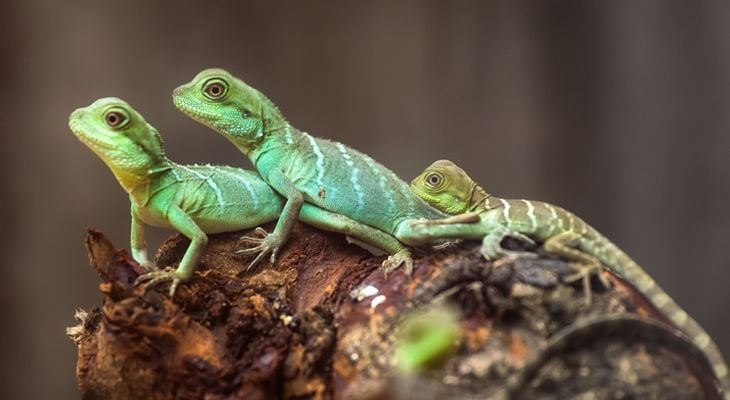Parents love both their children and their pets. Many pet owners even call their pets fur children. But it is important to create a safe and healthy environment for both children and pets. We especially worry about parasite and bacterial transmission from animals to people, although the reverse can occur
Read more

People with limited living quarters may find that reptiles such as lizards or turtles fit perfectly into their lifestyles. Before deciding on a reptile, learn as much as possible about them and their needs. Poisonous snakes and certain reptiles should never be kept as pets. Ask your veterinarian about the suitability of a particular animal before you make your decision. There are many things to consider before committing to a reptile as a pet.
Finding out if a Pet is Legal Where You Live
Many areas have enacted laws pertaining to keeping reptiles. Some are general and some are quite specific; in many places any reptiles that are considered dangerous (venomous snakes, alligators, etc.) are illegal but some places are even more restrictive (for example, in some states all constricting snakes including ball pythons are illegal).
Salmonella Risks and Prevention
All reptile owners need to be informed about Salmonella infections. While the risks shouldn't keep most people from keeping reptiles since with the proper management the risks are minimal. Still, owners should be aware of the risks, and the US Centers for Disease Control recommends that certain risk groups should be careful about contact with reptiles and amphibians.
The Importance of Light and Heat
Many problems with keeping reptiles can be traced back to not providing the proper environmental conditions, particularly heat. Proper lighting is also important for many reptiles. The equipment to provide the proper heat and light to captive reptiles is often quite expensive, but is absolutely essential to keeping pet reptiles healthy. It is important to find out exactly what conditions your reptile needs and never cut corners when it comes to meeting those conditions!
Why Choose Captive Bred Reptiles
There are numerous reasons why you should pick a captive bred reptile if at all possible, as explained here.
How to Pick a Healthy Reptile
It is important to keep in mind that depending on where you get a reptile, it may be very stressed, dehydrated, and prone to illness. Here are some items to look for when buying your reptile to increase the chances of picking out a healthy pet reptile.
While there are many types of reptiles that could be good pets, here we cover a few you could consider.
-
Ten Tips to Keep Kids and Pets Safe
Category: Newsletter Library, Tips for Pet Owners
-
How to Keep Your Cat from Getting Fat
Category: Newsletter Library, Cats
A fat cat may appear happy and provide visitors with a source of amusement, but feline obesity is certainly no laughing matter. Cats who carry excess weight have a heightened risk for diabetes, cancer, liver problems, degenerative joint pain and other conditions that could severely curtail its quality
Read more -
Is a Feral Cat Right for You?
Category: Newsletter Library, Cats
In many ways, Tiger Kitty (or TK as he's known for short) isn't your typical feral cat. Unlike his still-wild counterparts who still roam around, homeless and often hungry, he now has a home. When his owners get home at night, he runs out to meet them and rubs against their ankles looking to be patted.
Read more -
Keep Cats Moving and Grooving
Category: Newsletter Library, Cats
Keeping your cat active can help it burn calories and use muscles, tendons and ligaments that may often be seen catnapping. Burning calories is important for your cat. The more your cat moves and exercises, the more calories it will expend during the activity. Exercise will help to off-set the naps taken
Read more -
Litter Box Problems
Category: Newsletter Library, Cats
One of the most common complaints that cat owners make is that a cat will not use its litter box properly. Usually it is a problem with the cat urinating outside the box, but occasionally a cat will be defecating outside the box, or a cat may not want to use his litter box at all! First the cat should
Read more -
Lilies are Dangerous to Cats
Category: Newsletter Library, Cats
A significant source of toxicity for cats that is unknown to many people are lilies. These flowers are beautiful, available in a variety of colors, and common in cut flower arrangements. They are also easy to grow and are found in many gardens. But, they can be very dangerous for cats. The Animal Poison
Read more -
Managing Feline Asthma
Category: Newsletter Library, Cats
Humans are not the only ones who can suffer from asthma. It is a condition that can also afflict cats. Feline asthma is similar to human asthma, in that it is a chronic inflammation of the airways inside the lungs. During an asthma attack, these airways become constricted, and the lungs create mucus
Read more -
My Cat Grooms Excessively — Is Something Wrong?
Category: Newsletter Library, Cats
It is normal for cats to groom themselves throughout the day. In fact, cats may spend up to one half of each day grooming themselves. For this reason, you may not even notice if your cat starts to groom himself or herself excessively. Nonetheless, if your cat constantly licks himself or herself or is
Read more -
Trimming Your Cat's Claws
Category: Newsletter Library, Cats
Cats are generally regarded as "self-grooming" pets, though they do need their humans for some grooming activities. One grooming technique cats are unable to perform on their own is trimming their front nails. While some indoor-only cats are de-clawed in the front (this means their claws have been removed
Read more -
Two Common Diseases of Geriatric Cats
Category: Newsletter Library, Cats
Cats are living longer and longer. This is due to better medical care and the fact that more cats are living only indoors. These cats commonly live up to 15 to 18 years of age, with a few living into their twenties. The oldest cat on record lived to be 38! The two most common diseases of the geriatric
Read more -
Unnecessary Risks Cat Owners Take
Category: Newsletter Library, Cats
There are specific activities that can make a positive difference in your pet's health. The difference will be enhanced health and wellness when you integrate them into your current pet maintenance program. Feeding, grooming and vaccinations are probably your top-of-mind priorities. Sometimes you can
Read more -
Fun Cat Trivia
Category: Newsletter Library, Cats
Cats are amazing animals. They have become one of the most popular pets because of their playfulness, independent nature, daily low-maintenance lifestyle, and affectionate personalities. Enjoy these fun facts about your favorite feline. A group of kittens is called a kindle; a group of cats is called
Read more -
Flea Prevention Is Important for Cats Too!
Category: Newsletter Library, Cats
When most people think of who needs flea prevention, the family dog is at the top of the list, and often cats are forgotten or assumed to be flea free. Dogs are bathed more regularly than cats and when they scratch it’s much more obvious. Cats are very clean creatures; they groom themselves daily and
Read more -
The Myth of Natural
Category: Newsletter Library, Keeping Pets Healthy
Pet owners occasionally tell veterinarians they are reluctant to use prescription medicine, spot-on flea products, heartworm preventatives, etc, because they would rather use something that is "natural." They are afraid of chemicals, and would rather use something that is organic or natural. But what
Read more -
Ringworm in Cats and Dogs
Category: Newsletter Library, Keeping Pets Healthy
Ringworm is not actually caused by a worm, but rather by a fungus that infects the outer layer of skin and hair. It is a zoonotic disease, meaning it can be transmitted from pets to humans, or people to pets. There are numerous species of ringworm. It is most commonly recognized in cats (often kittens)
Read more -
Orthopedic Care for Dogs
Category: Newsletter Library, Keeping Pets Healthy
Joint problems plague dogs just as commonly as they do humans. That's why orthopedic care can improve your beloved friend's quality of life. Common Orthopedic Issues A dog's joint problems may result from a variety of orthopedic injuries and illnesses. In some cases, these vulnerabilities are partly
Read more
